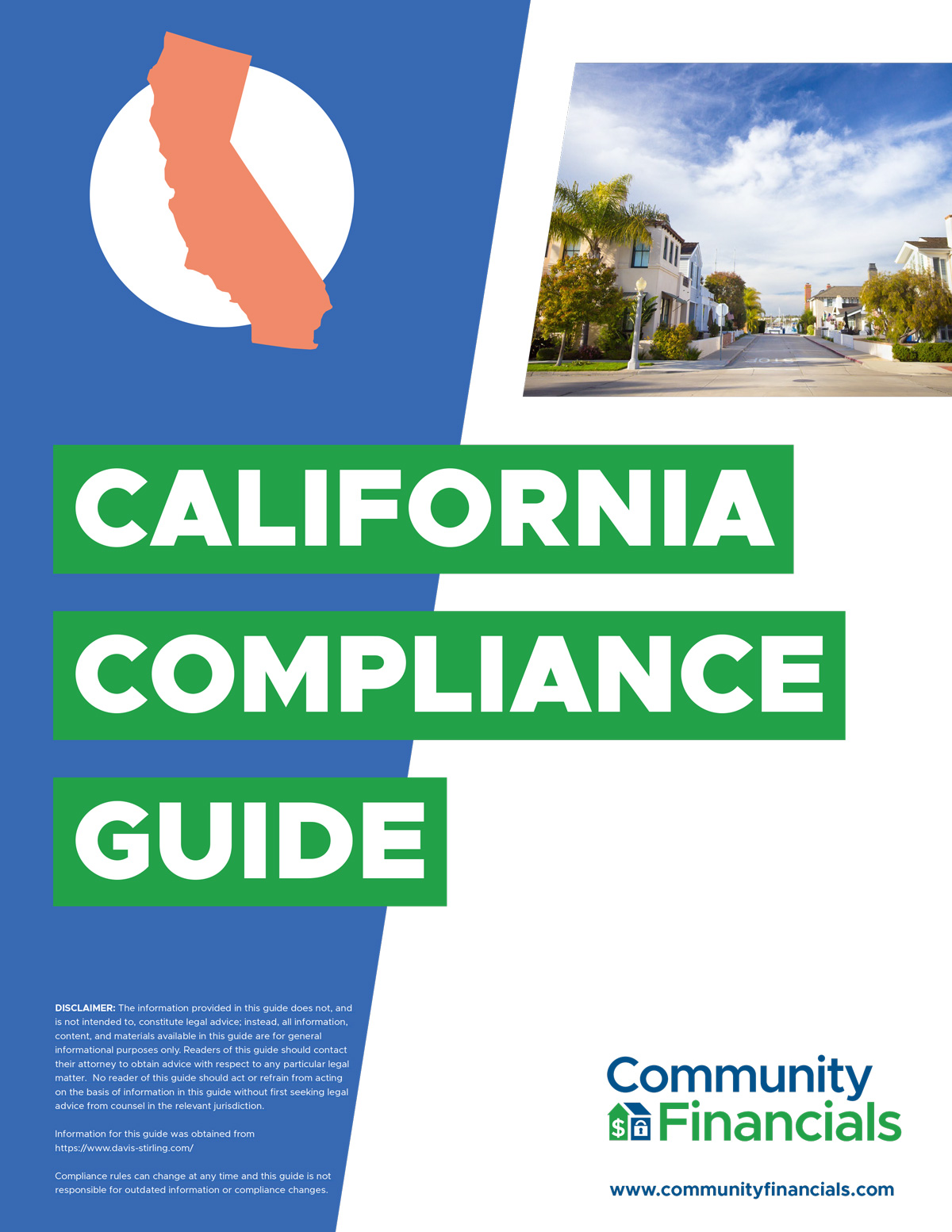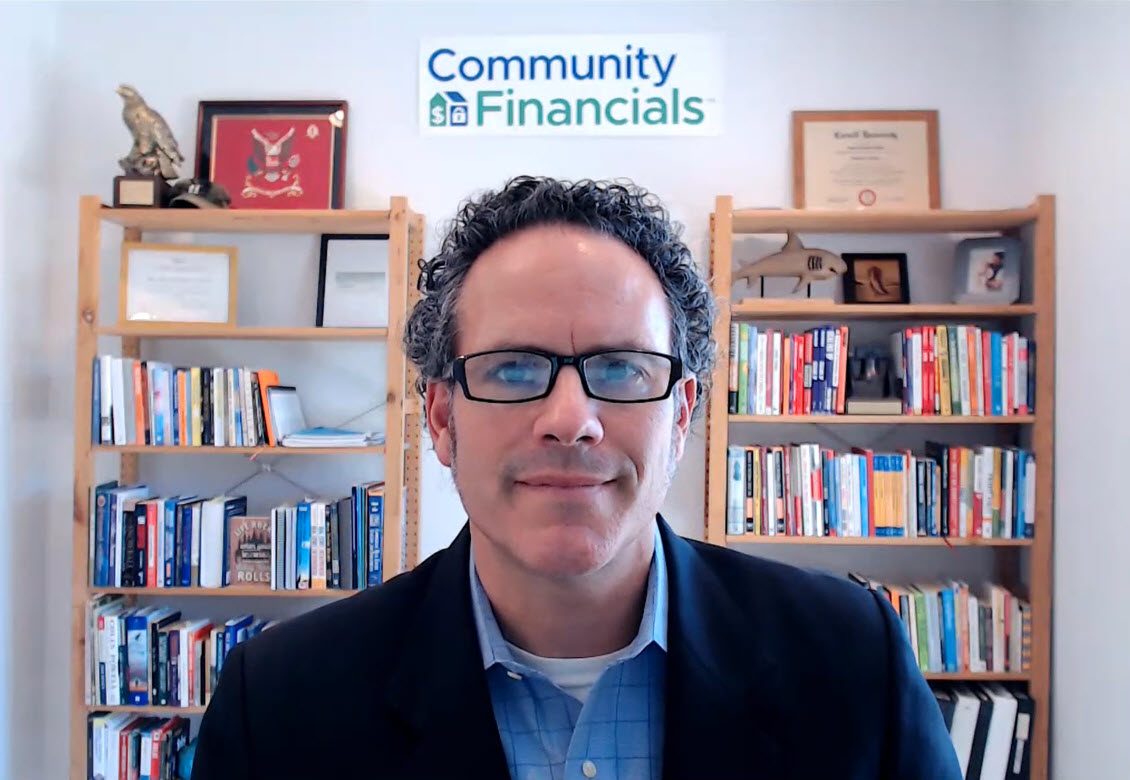2024 California HOA Regulation Changes Every Board Should Know
Navigating California’s complex HOA regulations can be challenging for board members and community managers. Staying compliant with the latest legal updates is crucial to maintaining smooth operations and protecting the interests of homeowners. With the introduction of significant changes to California HOA laws in 2024, it’s more important than ever to understand how these regulations affect your community.
Community Financials has analyzed these updates to highlight the key changes that will impact HOAs across the state. Below, we’ll break down the most important regulatory updates and provide insights to help your association stay compliant and informed. Download the full guide for free to get a complete understanding of California HOA laws today!
Key Changes to Board Member Requirements and Qualifications
Expanded Candidate Disqualification Criteria
One of the most significant updates in 2024 is the expansion of candidate disqualification criteria. Associations are now required to disqualify nominees if they are not members of the association at the time of nomination, or if they have reached the maximum number of allowable terms.
This ensures that only eligible and committed members can run for the board, maintaining the integrity of the election process.
Updated Board Training Requirements
One of the important updates in the 2024 California HOA regulations involves board training. The Davis-Stirling Act now calls for the Department of Consumer Affairs and the Department of Real Estate to develop an online education course specifically for HOA board members.
This course covers the roles, duties, and responsibilities of directors, along with the non-judicial foreclosure process, ensuring that all board members are well-informed and capable of carrying out their duties.
Stricter Permissive Qualifications for Board Members
In addition to the mandatory qualifications, the 2024 regulations now include stricter permissive qualifications for board members. A key update is the requirement that sitting directors must remain current on their payments for regular and special assessments. If a director falls behind, they can be disqualified from continuing to serve.
This change emphasizes the importance of financial responsibility among board members, ensuring they meet their obligations to the community.
Updated Election Procedures
New election procedures introduced in 2024 ensure greater transparency and fairness in HOA elections. Associations are now required to adhere to the following key changes:
- Candidate Registration List: Associations must maintain a list of all candidates running for election. This list needs to be available for review by the members.
- Voter List: A voter list must also be maintained, which includes the names of all eligible voters within the association.
- Review Period: Both the candidate registration list and the voter list must be made available to members for review at least 30 days before ballots are distributed.
- Error Correction: If any member notices an error in the lists, they have the right to request corrections. Associations must correct these errors within two business days to ensure accuracy.
These new procedures are designed to promote transparency and provide members with ample opportunity to ensure the election process runs smoothly and fairly.
Stricter Rules for Director Removal and Replacement
The 2024 updates also include important changes to the rules governing the removal and replacement of HOA board directors. These changes provide clearer guidelines on when and how directors can be removed, ensuring boards maintain high standards of leadership and accountability.
Expanded Director Removal Conditions
Associations now have more explicit conditions under which a director can be removed. In addition to the existing reasons, such as missing too many meetings or being declared of unsound mind, the 2024 regulations specify the following scenarios for removal:
- Felony Conviction: A director can be removed if they are convicted of a felony, particularly if this conviction affects the association’s ability to maintain its required insurance coverage.
- Failure to Meet Qualifications: If a director no longer meets the qualifications required by the association’s bylaws or governing documents, their position can be vacated. For example, a director who falls behind on payment of assessments can now be disqualified and removed from the board.
Member-Initiated Director Removal
In addition to board-initiated removals, HOA members retain the right to remove directors. The updated regulations clarify the process for member-initiated removal:
- Quorum and Voting Requirements: A majority of voting members must approve the removal of a director. If the association has 50 or more members, removal is approved by a majority of votes at a meeting with a quorum present.
- Blocking Removal: The new rules state that if the votes cast against a director’s removal are sufficient to have elected the director in a cumulative voting scenario, the removal can be blocked. This ensures that directors cannot be easily ousted by a small group of voters.
Replacement of Removed Directors
The 2024 updates clarify the process for replacing removed directors. If a director is removed, their replacement must be elected by the membership, not appointed by the board, unless the bylaws state otherwise. This change strengthens the role of the membership in board elections and ensures that replacements are chosen fairly.
These stricter rules help maintain board integrity and accountability, providing clear guidelines for both removal and replacement processes. To fully understand how these changes could impact your HOA, be sure to download the full guide from Community Financials.
Changes to Board and Membership Meeting Requirements
The 2024 updates also bring several changes to the rules governing how board and membership meetings are conducted. These changes aim to enhance transparency, protect members’ rights, and ensure meetings are properly structured and accessible to all relevant parties.
New Teleconference Regulations
Another key update is the clarification of teleconference meeting rules. While teleconferences have been a common practice for many HOAs, the new regulations ensure that these meetings are conducted in a way that protects members’ rights.
Key changes include:
- Physical Location Requirement: When a meeting is conducted via teleconference, associations must identify a physical location in the meeting notice unless the meeting is an executive session. At least one director or designated person must be present at this location to allow members to attend and participate if desired.
- Equal Access for Members: All participating directors and members must be able to hear each other during the meeting, ensuring transparency and open communication.
Open Meeting Requirements
The 2024 regulations reinforce the need for open board meetings, where decisions are made transparently in front of the membership. Key points include:
- No Action Outside of Meetings: The board is prohibited from taking action on any business item outside of a scheduled board meeting. All discussions and decisions must happen during the meeting, which must be properly noticed and open to members.
- Meeting Notices and Agendas: The association must provide notice of board meetings at least four days in advance, including a clear agenda. The meeting agenda must detail all items to be discussed, and no off-agenda topics can be voted on unless in emergency situations.
New Rules for Emergency Meetings
The 2024 updates also introduce stricter rules for conducting emergency meetings, which are often held with shorter notice and under urgent circumstances:
- Electronic Emergency Meetings: The board can conduct an emergency meeting via electronic communication, such as email, but only if all directors consent in writing. These consents must be filed with the meeting minutes to ensure transparency.
- Emergency Situations Defined: An emergency situation is defined as one that requires immediate action and could not have been reasonably foreseen. This clarification helps prevent misuse of emergency meetings for non-urgent matters.
These updated meeting requirements ensure greater openness and member involvement in HOA decision-making processes. Download the full guide from Community Financials for a comprehensive understanding of these changes and how they affect your association.
Enhanced Record Keeping and Notice Requirements
The 2024 updates also bring minor changes to how HOAs manage their records and provide notices to members. These changes are designed to ensure transparency, protect sensitive information, and streamline how associations communicate with their members.
Improved Notice Delivery Methods
The 2024 updates provide clear guidance on how associations must deliver notices to members, ensuring that all members receive important information in a timely and accessible manner:
- Preferred Delivery Method: Associations are now required to deliver notices using the member’s preferred delivery method, as specified by the member under Section 4041. If the member has not specified a method, the association must default to first-class mail or a similar delivery service.
- Secondary Address Requirements: If requested by the member, associations must now send important documents, including financial notices and delinquency reports, to a secondary address specified by the member.
- General Notices: General notices, such as meeting notices or policy updates, can be delivered through multiple methods, including email, newsletters, or posting in a common area. However, if a member requests individual delivery of general notices, the association is required to comply with that request.
Navigate 2024 HOA Regulations with Confidence
Staying on top of California’s evolving HOA regulations is essential for smooth operations and protecting your community from potential legal issues. The 2024 updates introduce new rules that board members need to be aware of, and these changes affect everything from member qualifications to election procedures and meeting transparency. By thoroughly understanding these new regulations, your HOA can stay compliant and foster a stronger, more transparent community.
To help you navigate these updates with ease, Community Financials has put together a comprehensive guide that goes into even greater detail about these changes and how they impact your association. As a trusted resource for HOA and condo financial management, Community Financials provides expert insights and practical tools that make compliance straightforward and accessible.
Download the full 2024 California HOA Compliance Guide today to ensure your board is fully informed and prepared for the year ahead. With Community Financials by your side, you can trust that you’re receiving the highest level of service and support for all your association’s financial and compliance needs.


